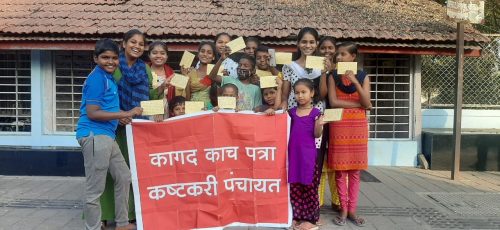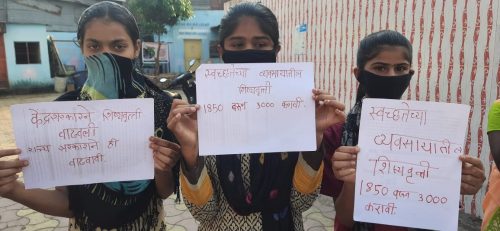Posted by Alliance of Indian Wastepickers
Written by Aditya Vyas & Shrenik Mutha
Region Asia-Pacific
Country India
April 02, 2021
Waste pickers and other informal sector waste workers make a living collecting, sorting, recycling, and selling materials that others throw away. They contribute to local economies, public health and environmental sustainability. The vast majority of waste pickers in India are women, and Dalits, who have been invisible to society, faced discrimination and worked without recognition for years. Pune is at the forefront of waste picker integration. In 1993, a trade union of waste pickers called Kagad Kach Patra Kashtakari Panchayat (KKPKP) was formed, to bring together waste pickers, itinerant buyers and other allied informal waste workers. Over the years, the union has argued for the workers’ right to waste, the dignity of work and for recognition of their contribution to the city. One of the core objectives of the union has been to ensure that their next generation has access to formal education and have a wider choice of occupations accessible to them. KKPKP has been advocating for the inclusion of the children of waste pickers into schools, supporting them through education with scholarships, notebooks, felicitations, and enrolment into government scholarships, and facilitating access to higher education through vocational guidance and soft loans.
 The Central Government initiated a Pre-Matric Scholarship to the children of those engaged in occupations involving cleaning and prone to health hazards from the year 1978. Waste pickers members of KKPKP argued for their inclusion as one of the eligible categories under this scholarship as early as 2000. KKPKP has been advocating with the State Government and Zilla Parishad Pune and the schools to ensure the inclusion of all children studying from classes 1 to 10 in this scheme. The implementation of this scheme has been a tumultuous process. (waste pickers excluded, then again included in 2013 after waste picker’s organisations advocated for the same. Read here for more details.)
The Central Government initiated a Pre-Matric Scholarship to the children of those engaged in occupations involving cleaning and prone to health hazards from the year 1978. Waste pickers members of KKPKP argued for their inclusion as one of the eligible categories under this scholarship as early as 2000. KKPKP has been advocating with the State Government and Zilla Parishad Pune and the schools to ensure the inclusion of all children studying from classes 1 to 10 in this scheme. The implementation of this scheme has been a tumultuous process. (waste pickers excluded, then again included in 2013 after waste picker’s organisations advocated for the same. Read here for more details.)
In 2018, the Central Government announced an increase in the scholarship amount from Rs.1850 to 3000 per year. The state government had not implemented the change. Poornima Chikarmane from Kagad Kach Patra Kashtakari Panchayat, Pune and Jyoti Mhapsekar of the Stree Mukti Sanghatana, Mumbai had met the Minister for Social Justice & Special Assistance along with the Deputy Chairperson of the Maharashtra Legislative Council, Ms Neelam Gorhe just prior to the covid pandemic. They were assured that this would be raised in the State Legislative Assembly of Maharashtra and that the waste pickers’ demand was legitimate.
 The pandemic delayed this process and further exacerbated the situation of children who had to get accustomed to the digital mode of education. With a lack of access to smartphones and the internet, many children struggled to keep up with the classes. Waste pickers of KKPKP and their children started a postcard campaign addressed to the concerned Minister-Shri Mundhe. 1500 children of KKPKP members eligible under the scholarship sent postcards from their local post offices or boxes. (Read here and here.)
The pandemic delayed this process and further exacerbated the situation of children who had to get accustomed to the digital mode of education. With a lack of access to smartphones and the internet, many children struggled to keep up with the classes. Waste pickers of KKPKP and their children started a postcard campaign addressed to the concerned Minister-Shri Mundhe. 1500 children of KKPKP members eligible under the scholarship sent postcards from their local post offices or boxes. (Read here and here.)
Their resolution, grit and determination paid off when on March 1, the government issued a resolution with the updated guidelines for implementation of the scheme. However the battle is only half won, and the waste pickers and their children can truly rejoice only when the scholarship money that is rightfully theirs is remitted to their bank accounts
Tweet

